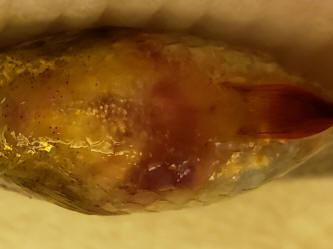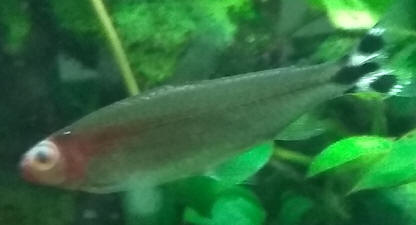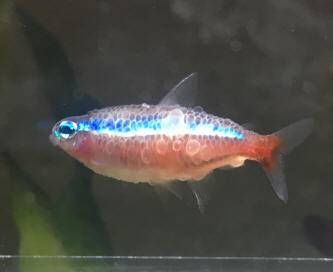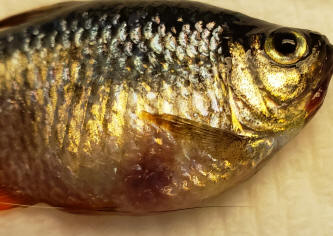|
FAQs on Characoids/Tetras & Relatives
Disease/Health 6
FAQs on Characoid Disease:
Characoid Disease 1,
Characoid Disease 2,
Characoid Disease 3,
Tetra Disease 4, Tetra Disease 5,
FAQs on Characoid Disease by Category:
Diagnosis,
Environmental,
Nutritional,
Infectious,
Parasitic,
Social,
Treatments
Related Articles:
Characoids/Tetras & Relatives,
Related FAQs: Characoids/Tetras &
Relatives, Characoid
Identification, Characoid
Behavior, Characoid
Compatibility, Characoid
Selection, Characoid Systems,
Characoid Feeding,
Characoid Reproduction,
|

|
|
White circle around Rummynose eye
3/31/20
Dear WWM,
Thank you for the excellent guidance you provide, it helps us to enhance our
understanding of the wet pets.
<Thanks for these kind words!>
The attached picture is of one of my 7 Rummynose tetras who would be about
2.5 years old in the tank. It has developed this white circle around the
left eye but Its behavior is otherwise normal. Swimming, interested in food
and energetic. I think another one of the group is also showing a trace of
something similar in 1 eye.
<Looks like 'Pop-eye', or Exophthalmia.>
Some details of the tank: It is a 29 gallon heavily planted non CO2 tank in
its 9th year. Mostly slow growing plants, LED lighting on 8.5 hr. timer.
Fish include various small tetras, Corydoras cats, Bristle nose and whiptail
plecs, cherry barbs, Kuhli loaches which seldom show up, and a pair of
Bolivian Rams. Filtered by three 500 l/hr. HOB filters with ceramic media,
sponge, SeaChem de nitrate. pH 7.5 (stable), TDS 225 ppm in meter, NO3 about
30. Small dosing of DIY macros every other day and weekly with Flourish
Comprehensive and Iron alternatively. Indian summer is pushing the temp up
to 28.5 C and then the chiller brings in down to 26.5. This happens at least
4 times a day, so might be a source of temperature fluctuation related
stress. Bi weekly water change of 50 percent. No live food, Hikari, Ocean
Nutrition, Tetra and NLS flakes and pellets
Can you please tell me what might be wrong? And do I need to intervene?
<If the pop-eye is a single eye, the chances are you're dealing with
physical injury. The use of Epsom salt (1-3 teaspoons per 5 gallons/20
litres) is useful for reducing the swelling. This will raise the general
hardness a bit, but across a few weeks won't do any harm. Beyond that,
there's nothing much to be done, and with luck the swelling will go down.
If both eyes are popping, that's more serious, and tends to imply
environmental stress or a bacterial infection.>
Please stay safe and healthy.
<And likewise to you and yours.>
Thanks and regards
Devakalpa
<Hope this helps, Neale.>
|
 |
|
Re: White circle around Rummynose eye
4/1/20
Dear Neale,
Thanks for the details. I am afraid that the affected fish did not survive.
I did not see it in the morning, so must have been consumed by the other
inhabitants.
<Oh dear. Let's hope nothing contagious was passed between them.>
I am doing a major water change and cleaning filters. Other fish and inverts
seem normal for now.
Regards
Devakalpa
<Well, good luck with remaining livestock. Take care, Neale.>
Re: White circle around Rummynose eye <<RMF LOOK for update>>
4/3/20
Dear Neale,
Thank you.
<Welcome.>
I saw on the WWM website that our mail exchange has been published but the
second message and its response is missing. May be it will be updated later.
<I believe this is what Bob F does, as the days, weeks pass.>
I wonder if that discontinuity might misguide someone later who could
associate the picture/symptom with PopEye only and miss out on your updated
prognosis of a possible bacterial infection, likely columnaris.
<Understood. It may well be that Bob will collate both/all massages, making
it clear where we went with this.>
Please consider not publishing this message.
<Noted; Bob?>
<<I am only finding the posting from 3/31 and 4/1... is there another? RMF>>
Thanks and records
Devakalpa
<Cheers, Neale.>
Re: White circle around Rummynose eye
4/6/20
Dear WWM,
<Dev.>
I am so sorry to have confused you. Please find attached the complete
correspondence.
When I requested 'please consider not publishing *this* mail', I meant the
same mail itself as that had nothing about the fish health question, but on
missing portions of our correspondence on your website. So I felt it might
not be necessary to be archived. I will request the same for the current
mail as well.
Stay safe, stay well. This too shall pass.
Thanks and regards
Devakalpa
<IS all posted as far as Neale and I are aware. Please find here:
http://wetwebmedia.com/FWSubWebIndex/fwdailyfaqs.htm
Bob Fenner>
|
|
Cardinal tetra with balloon like scales
10/8/19
Dear WWM,
My cardinal developed a single, large, solid white, ball-like spot on its
flank about 2 weeks ago. It seemed completely active and normal otherwise
and the single spot was unlike anything I could find pictures or
descriptions of. After speaking to the fish store who didn't think it looked
fungal, I decided to watch and wait. The "spot" disappeared after 7 or 8
days. At this point the fish developed some fluffy cotton wool like patches
which seemed more classically fungal, and another in the shoal of 8
cardinals also seemed to show a small patch of something similar. I put the
two fish in a hospital tank and started to treat with a treatment called
Dessamoor, which contains copper sulphate, ethacridine lactate, Methylene
blue, and Acriflavine chloride. I followed the dosing instructions
accurately but when I checked in on the fish after about 4 or 5 hours (who
had seemed pretty normal behaviourally despite the cotton wool), they had
lost most of their colour. I guessed that if I left them there they would
die. So I put them back in my community aquarium and just watched. Over the
next week, the fish with the more obvious problems seemed to get more of the
growth. The other one's possible cotton wool tuft seemed to clear up. Then I
realised about two days ago that the scales of cardinal with the greater
problems seemed to have swollen up hideously - see picture attached. I'm not
sure when this started - it's possible that the 'cotton wool' appearance was
an early stage of the process. It was a bit difficult to see well in a well
planted 120 L tank.
I have now put this poor fish in a separate container (my "hospital" tank is
currently occupied by an aggressive dwarf gourami). I will buy a new
hospital tank for the cardinal tomorrow. I wanted to try salt but I've read
that cardinals tolerate it poorly. I have just bought Melafix and Pimafix
and was going to try these empirically - but having read other advice on
your website it seems these don't do anything. So I am at a loss. I have no
idea what to do or what the disease is. Oddly, the fish is active and until
I separated it was behaving as normal and eating well. Now it's stressed,
buzzing intermittently about its container, and won't eat, but I am pretty
sure the latter is stress-related rather than due to the illness. The 7
other cardinals all look fine, as do 3 corys and an Ancistrus. I've a couple
of dwarf gouramis as well. They occasionally seem to get agitated and brush
against plants as if they are itching these past 3 or 4 days. But they have
no external stigmata thus far, and most of the time look and behave normally
and seem happy enough.
Finally, the problems seemed to start when over a 2-month period I cleaned
the tank about 2 times only given holidays etc. Usually I do a partial water
change (approx 30%) weekly. After separating the cardinal a couple of days
back, in the absence of knowing what if anything to treat the main tank with
I did a 70% water change and rinsed all the plants, driftwood, gravel. My
water parameters are nitrite 0, nitrate 25 mg/L, general hardness >16°,
carbonate hardness 20°, pH 6.8, Cl2 0.
Please help...!
Sanjeeva
<I am not optimistic here. The bubbles are epidermal tissue that has
swollen up with tissue fluid, and now protrudes past the scales.
It's the sort of thing we'd call Dropsy if the swelling was internal.
There's no obvious solution here. A good antibiotic might be worth a shot.
The use of salt, at 2 gram/litre, is perfectly safe with Amazonian fish such
as Cardinals for short periods (a few days or weeks) and is actually much
less stressful than traditional medicines such as formalin and organic dyes.
It's a tough one. If this fish is stressed, then humanely destroying it will
be the best move. But if it's feeding and otherwise behaving normally, you
might elect to medicate. Good luck, Neale.>
|
 |
|
Re: Question concerning sudden Columbian tetra death
6/6/19
Hi Bob,
Everyone is accounted for this morning and hungry. I see no signs of illness in
any of the remaining 12 tetras.
<Ah, good>
I added some StressGuard to tank yesterday and the tetra with one swollen and
cloudy eye is very much
improved. I found a second tetra with cloudy eye and it has completely resolved.
I'm seeing some nipped tail fins and a lot of aggressive chasing among the
tetras.
<To be expected>
If not fish on fish aggression, I'm thinking that I may have contributed to the
one tetra's demise. I mix my water for water changes in a large trash can and I
use a small pump to add water to the tank.
<I wager this is a good practice. It is summat what I do... heating, storing
pre-mixed freshwater a week ahead of change outs... in totes in a greenhouse;
moving the water with a pump>
I try to direct the water flow away from the fish but it's difficult with the
top configuration of the acrylic tank and the fish are so curious. I'm thinking
I may have unintentionally hit them with a strong stream of water. I may go back
to adding the water in using a container.
The blood worms that I use are San Francisco Bay frozen cubes.
<Also an exemplary source, company>
I'm trying to give the Acara some variety as he refuses pellets and other than
the cichlid flakes the blood worms are the only frozen food he will eat. I will
discontinue if they are harmful for the tetras. They aren't fussy eaters.
I hope this smaller photo file goes through.
Thank you again for your help.
Susan
<This one fish... the spot... could be resultant from a physical trauma;
secondarily bacterial. Bob Fenner>
|
 |
|
Re: Question concerning sudden Columbian tetra death
6/6/19
Second pix from underneath.
Possible nip? Skin is open
<Good pix. Again; could be. BobF>
|
 |
Diamond Tetra swimming erratically
4/14/19
Dear WWM,
Hope you are doing fine. Thank you for maintaining this excellent site, a great
help to us hobbyists.
<Thanks for the kind words.>
Question: One of my 6 Diamond Tetras have started swimming erratically since
yesterday. They are established fish, in the tank for almost 2 years.
There is no bloating, no injury marks, no loss of sparkle, no excess mucus and
all the fins are intact. It just kind of topples over or at times fall sideways,
try to regain posture and the cycle repeats.
<Understood. This does happen, and usually indicates environmental distress if
sudden. There's no real treatment, beyond ensuring stable, ideally optimal
conditions. Filtering the water with carbon should help, and if the carbon is
older than a couple weeks, then change it. Carbon should remove things like
insecticide sprays that can be used in the home but unfortunately are highly
toxic to fish. Otherwise, this sort of erratic swimming can indicate Whirling
Disease (Myxobolus cerebralis) but this is extremely rare in aquaria because of
its complex life cycle. Of course erratic swimming can be a symptom of things
like White Spot, Velvet, Dropsy, and Finrot, but it should be obvious if this is
the situation here.>
Tank is heavily planted 29 gallon, in its 8th year. No Ammonia or Nitrite,
Nitrate 25. Filtered by three 500l/hr HOB filters filled with sponge, bio balls
and ceramic media. Also a small bag each of Seachem Purigen and Carbon. Another
pump works a chiller. pH 7.6, TDS 300ish. Tank mates include other tetras,
Pencilfishes, Corydoras, BNP, Ram cichlids, all other fishes looking absolutely
fine.
Points worth mentioning: I had a sudden surprise attack of Ich after years, 2
weeks after I introduced some Cardinal Tetras which themselves had no visible
spots and were claimed to be quarantined by a reputed seller I have dealt with
in the past. The spots affected only some Green Neons. I went the high temp way
and allowed the tank to reach 31 C over the last 5 days.
The spots are almost gone now. No fish is showing any signs of Oxygen hunger, no
gasping at the surface, there is good circulation and surface agitation. I
usually maintain the tank at 25.5-27.5 degrees C with a chiller (this is an
Indian summer).
I fed freeze dried Tubifex worms yesterday, which I do rarely. Else their diet
is from various flakes and pellets from Tetra,, Ocean Nutrition and Hikari.
I added the regular weekly dose of Seachem Flourish comprehensive and Flourish
Iron yesterday, a practice I have followed for years. I also add 5 ml of a DIY
macro mix every other day as per the recipe from James's Planted Tank.
No use of paint fumes, aerosols, pesticides, etc. near tank. I have made a 40%
water change today but no improvement in conditions.
I replenished my dried Almond leaves 5 days ago, these are self collected.
Is this whirling disease?
<As stated above, extremely unlikely. The parasite needs other animals such
birds in the environment for the life cycle to complete, which really isn't
likely indoors!>
Or some kind other neurological issue?
<Certainly a possibility, if some toxin was present in the environment.>
Maybe the heat stress?
<Can be, though usually when tropical fish are exposed to cold. When too warm,
you normally see gasping behaviour rather than loss of motor control.>
Do I euthanize in case it is contagious?
<Almost certainly not contagious.>
Thanks in advance and keep well.
Devakalpa, India
<Hope this helps. Cheers, Neale.>
Re: Diamond Tetra swimming erratically 4/14/19
Dear Neale,
Thank you for the detailed reply.
<Most welcome.>
Unfortunately the affected fish passed away last night.
<No surprise, really. But always hopeful!>
I isolated it after mailing to you. Rest are fine as of now.
<Good.>
Regards
Devakalpa
<And to you, too. Cheers, Neale.>
|
|

